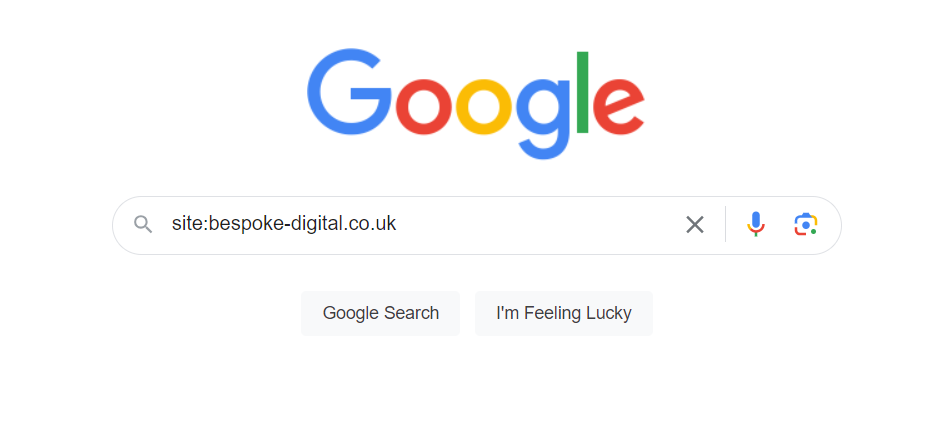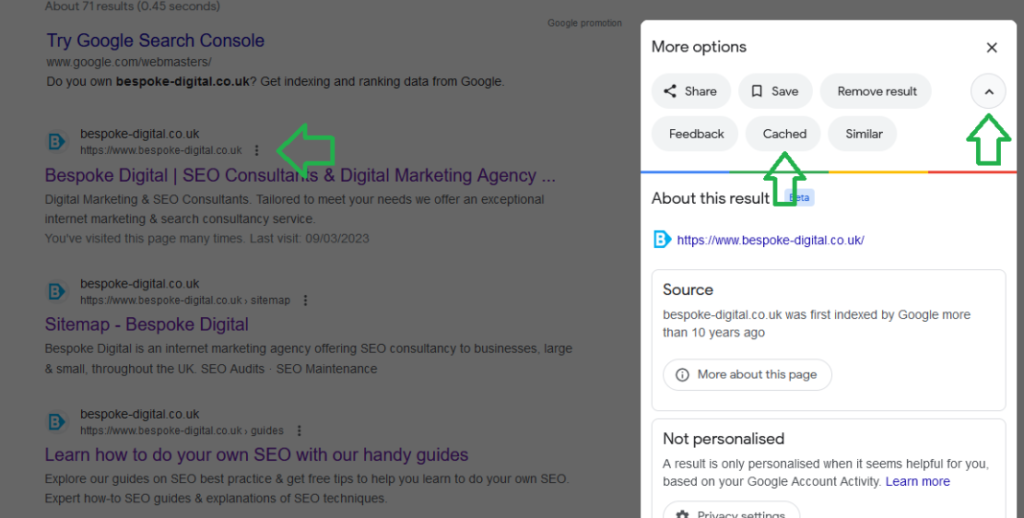Why is site: search useful for SEO?
A site: (site colon) search is an advanced search operator that can be used to find almost any page indexed on a website. Advanced search operators are useful for web users, helping them to refine their searches and more easily find what they are looking for, but can also be incredibly useful when it comes to your SEO strategy.
For me, a site: search should be the starting point of every website audit. Essentially, running a site: search operator limits the results of your chosen search engine, to only return those pages indexed within your specified domain.
This gives you an overview into how Google and Bing are currently indexing your site, providing insight into how many and what pages are (or are not) being found, highlighting potential issues with canonical URLs or duplicate content and quickly showing you what information people see about each page when your site appears in their search results.
Site: can also be used to limit search results to only return domains from a specific TLD (top-level domain), like site:.co.uk (see this put to good use in our guide to prospecting and outreach) or indeed to exclude domains from your search results (e.g. travel -site:bbc.co.uk) and it can be used in combination with multiple other search operators to create an advanced filtering of the SERPs.
Here is a great overview from Moz on 25 combinations using the site colon operator.
How to structure a site colon search.
You can use a site: operator to include, or exclude, pages from a root domain, subfolder or subdomain of a website.
Type “site:” followed by the domain you are exploring into Google’s search box.

As a rule, do not put a space between the colon and the domain and, until you are familiar with the results, I’d recommend that you leave out the www. element of any URLs.
To explore this further, here are three examples of this type of search:
site:thetimes.co.uk – an estimate of all pages indexed within thetimes.co.uk root domain.
site:jobs.thetimes.co.uk – an estimate of all pages indexed within the jobs subdomain of thetimes.co.uk.
site:thetimes.co.uk/travel/ – an estimate of all pages indexed within the travel subfolder of thetimes.co.uk.
It’s worth highlighting that the figure given as the number of pages found by this type of search is, in Google’s words, ‘an estimate’ of the number of pages matching this query. It is not an exact number and indeed you will often find that the number of results changes as you dig deeper into the search results, as that estimate gets refined and revised.
For this reason you can’t use it as an absolute when you are conducting an audit of a site, rather you should see it as a useful guide.
You may also notice that Google offers a ‘Google promotion’ result along with every site: search, suggesting that you might want to ‘try Google Search Console’. This is not a coincidence as Search Console is another great way of reviewing and monitoring what pages are indexed within your site. See our guide on the benefits of Search Console for further information.

The more specific you are with your search query the more accurate the estimate will be.
Don’t overlook the info: search operator.
A useful tip for SEO audits is using an info: search.

Similar to the site: search, but for the fact that you are querying the results for a specific URL rather than every page in your site. The equivalent search for Bing would be a URL: search.
The info colon search saves you the time of having to trawl through hundreds of pages to find the exact one you’re looking for. This is really useful to run spot checks on a specific page but generally not that useful for a full website audit as it’s too time consuming a process to look up each page individually.
Using Site: Search To Audit Content
As we have already discussed, the site: search operator allows you to see which pages from your website are indexed by the search engine. This also works in reverse. If certain pages that you are expecting to see aren’t showing up in the SERPs, it could indicate that you have an indexing issue that needs to be resolved. If you notice sudden drops in rankings or organic traffic, using the “site:” operator can help you determine if your entire site is affected or just specific sections or pages and guide your troubleshooting efforts.
Site: search also comes into play when checking how well your website’s individual pages are optimised for your target keywords. By using the operator followed by specific key phrases, you can evaluate the effectiveness of your on-page SEO and identify areas for improvement. Make sure to pay attention to title tags and meta descriptions when doing so to ensure they are relevant, and compelling enough to attract clicks from users.
Whilst this can be useful for your own site, using site: search to analyse keyword optimisation can also be applied to your competitors to compare performance. By using the operator in this way, you can gain valuable insight into their content strategy, and potentially discover an overlooked gap in your own approach to your website’s SEO.
What the site: search can do for you?
Essentially, the site: search is a great way of seeing what your potential site visitors will see when your web pages are delivered as part of their search results and analysing your page’s appearance in the SERPs.
Using site: search, you can check in on how your meta elements (link to meta elements article) are appearing in searches.
Page Title: You get to see how your page title is normally going to be displayed and can double check that it’s a good length (i.e. not truncated).

URL Cache Date: You see your URL and, not forgetting the three dots to the right of the URL, you can check the cached date/version of the page, plus look for similar cached pages on the web.

Meta Description: You get to see the meta description that will normally be displayed. Again, you can again check this for truncation.

* Note that the page title and meta description will not always be displayed in this format. Depending on the search term and intent of the user, Google may decide to amend or replace the page title and description. It may add your brand name, the publishing date or a section of the onpage content to these elements at its discretion.
Improving SERP Performance
While site: search can be a useful place to start your site audit, and, in turn, improve your SEO, it should be used in conjunction with a variety of other techniques in order to achieve success. For more information on auditing your site, our team are happy to help – get in touch with us today.
If you have any comments or questions about this post, or would like to discuss a specific issue with your site, please get in touch using the form below.
And connect with us on social media to stay upto date with our latest news:

